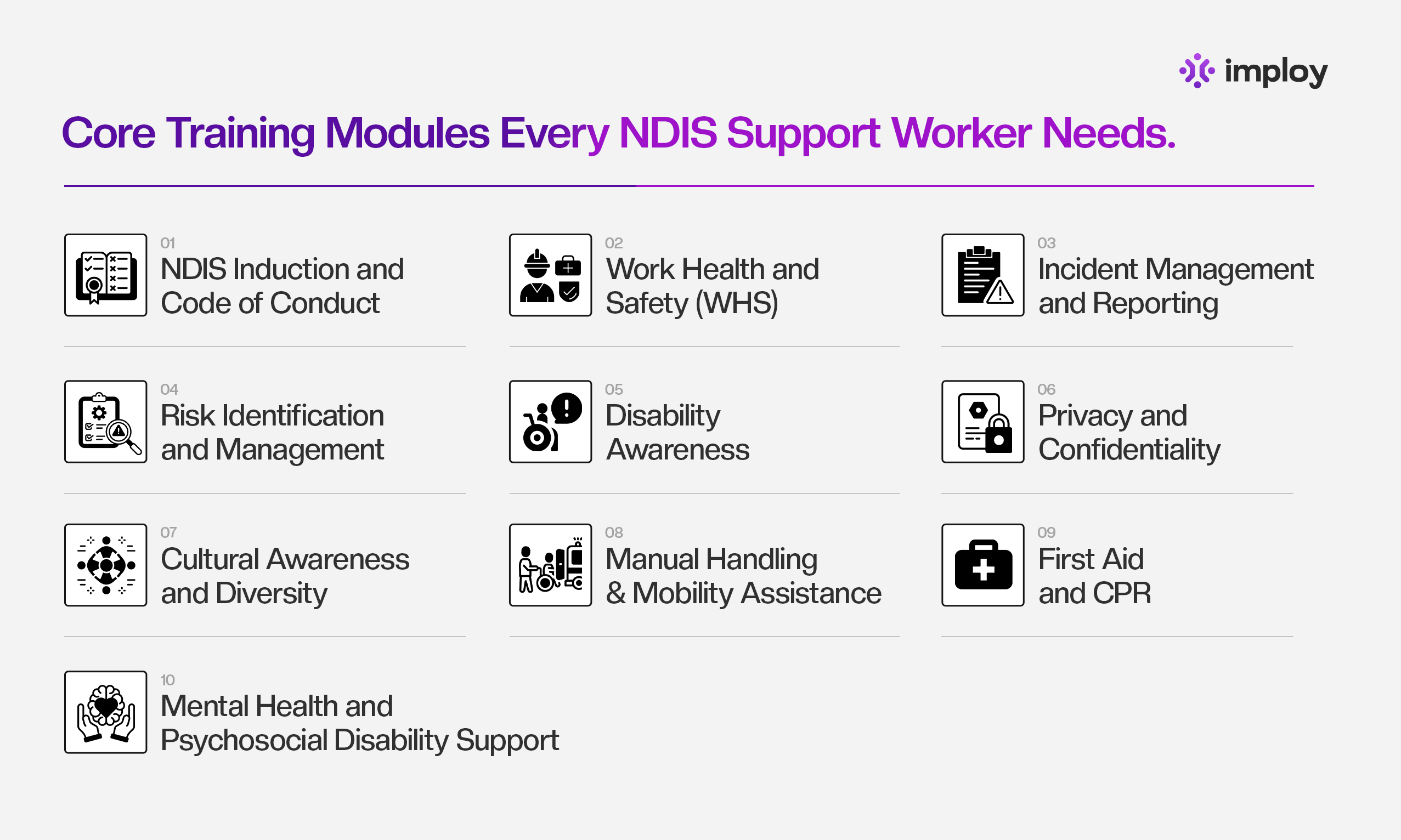Essential NDIS Support Worker Training Modules: A Comprehensive Guide
Discover the essential NDIS support worker training modules to ensure compliance, safety, and high-quality care for participants.

Delivering quality, safe, and person-centred support under the National Disability Insurance Scheme (NDIS) starts with one key ingredient - a well-trained workforce.
NDIS participants rely on skilled and knowledgeable support workers who understand not only the care they provide but also the responsibilities that come with it.
In this blog, we’ll explore the essential training modules every NDIS support worker should complete, and how they help providers stay compliant with the NDIS Practice Standards.
Why is Training Essential for NDIS Support Workers?
Proper training isn’t just about compliance - it’s about building confidence, consistency, and care quality across the board.
Here’s why training matters:
- Compliance with NDIS Standards: Ensures workers meet the NDIS Code of Conduct and Practice Standards.
- Safety and Risk Reduction: Helps prevent accidents, incidents, and health hazards.
- Trust and Professionalism: Builds participant confidence in their workers and providers.
- Better Outcomes: Trained workers can better support participants to achieve their goals.
In short, well-trained workers make the NDIS safer and more effective for everyone involved.
Core Training Modules Every NDIS Support Worker Needs
The NDIS Quality and Safeguards Commission requires all workers to be aware of their obligations and responsibilities.
Below are the core training modules every support worker should complete.

1. NDIS Induction and Code of Conduct
Every NDIS worker must understand the foundations of the scheme.
This training covers:
- The rights and responsibilities of participants.
- The NDIS Code of Conduct.
- Worker obligations, ethical behaviour, and professional boundaries.
It sets the tone for delivering safe, respectful, and participant-focused support.
2. Work Health and Safety (WHS)
Support workers often work in varied environments - from private homes to community spaces. WHS training ensures they can identify and manage risks safely.
Topics include:
- Safe work practices and hazard identification.
- Manual handling techniques.
- Emergency procedures and reporting.
3. Incident Management and Reporting
Knowing how to respond when something goes wrong is a must.
This training ensures workers can:
- Identify what qualifies as an incident.
- Properly make an incident reporting, and document it.
- Report it correctly under NDIS requirements.
- Follow up to ensure participant safety and compliance.
4. Risk Identification and Management
Every NDIS worker plays a role in keeping participants safe.
Risk management training teaches workers how to:
- Identify potential risks in the home or community.
- Assess and record risk levels.
- Apply control measures to reduce or eliminate hazards.
- Follow provider policies for reporting and monitoring.
This module ensures safety is proactive, not reactive.
5. Disability Awareness
This foundational module helps workers understand different types of disabilities and the barriers participants may face.
It promotes empathy, respect, and inclusion by covering:
- The social model of disability.
- Communication and accessibility considerations.
- Supporting independence and choice.
By developing awareness, workers can deliver support that truly empowers participants.
6. Privacy and Confidentiality
Protecting participant information is a legal and ethical obligation.
This training ensures workers understand how to handle sensitive data responsibly.
It includes:
- Privacy principles under the NDIS and Australian Privacy Act.
- Secure storage and sharing of participant information.
- Maintaining confidentiality in both physical and digital records.
7. Mental Health and Psychosocial Disability Support
Many NDIS participants live with mental health conditions or psychosocial disabilities.
This module focuses on:
- Recognising signs of mental distress.
- Supporting recovery-oriented practices.
- Promoting participant wellbeing and social inclusion.
8. Manual Handling and Mobility Assistance
Support workers often assist participants with transfers, mobility, and physical tasks.
Improper techniques can lead to injury for both the worker and participant.
Manual handling training teaches:
- Safe lifting and transfer methods.
- Use of mobility aids and hoists.
- Safe positioning and risk prevention.
9. First Aid and CPR
Every support worker should know how to respond to an emergency.
Accredited First Aid and CPR training provides the skills needed to manage medical incidents until help arrives.
Most providers require:
- CPR: refreshed annually.
- First Aid: renewed every three years.
10. Cultural Awareness and Diversity
Australia’s NDIS community is diverse.
Cultural awareness training helps workers:
- Communicate respectfully with people from different backgrounds.
- Understand cultural sensitivities.
- Provide inclusive support for Aboriginal, Torres Strait Islander, and CALD participants.
Together, these core training modules form the foundation of a skilled, confident, and compliant NDIS workforce.They empower support workers to deliver safe, respectful, and person-centred care - while giving providers peace of mind that their services meet NDIS Quality and Safeguards Commission standards.
When every worker is trained and supported, participants benefit from consistent, high-quality care that truly enhances their independence and wellbeing.
Optional but Highly Recommended Training Modules
Beyond the core modules, some extra training can greatly improve the quality of care and professionalism:
- Autism Awareness and Support - understanding sensory needs and communication techniques.
- Dementia Care - supporting memory loss and cognitive decline.
- Palliative and End-of-Life Care - providing compassionate care for participants in advanced stages of illness.
- Customer Service and Communication Skills - enhancing trust and relationships with participants.
- Digital Literacy for NDIS Systems - using PRODA, Myplace, and other digital tools efficiently.
Whether it’s mastering the core compliance modules or going the extra mile with specialised training, every learning opportunity helps build a stronger, safer, and more compassionate NDIS workforce.
Ongoing education not only improves service quality but also supports workers in feeling confident, capable, and valued.By investing in continuous training, providers create a culture of growth - one that ensures participants receive the highest standard of care and support every single day.
How Often Should Training Be Updated?
NDIS providers should maintain ongoing training schedules to ensure compliance.
Typical refresh cycles include:
- First Aid: every 3 years.
- CPR: annually.
- Infection Control: annually or as required.
- WHS & Manual Handling: every 1-2 years
- NDIS Code of Conduct & Induction: upon onboarding or when major policy updates occur
Continuous learning keeps workers informed and up to date with new standards or legislative changes.
How Does imploy Help?
At imploy, we make NDIS compliance and workforce management simple.
Our solutions are designed to help providers build strong, capable teams that meet the highest standards of quality and safety.
With imploy, you can:
- Onboard staff quickly and confidently with clear training and documentation processes.
- Stay compliant with NDIS Quality and Safeguards Commission requirements.
- Monitor and manage worker training to ensure ongoing compliance and readiness for audits.
- Save valuable time with tools that streamline administrative tasks and support everyday operations.
Whether you’re just starting your NDIS business or growing your existing team, imploy helps you operate efficiently, stay compliant, and deliver outstanding care to participants.
Final Thoughts
High-quality training is the foundation of safe, effective, and respectful support for NDIS participants. When support workers are confident in their skills and understand their responsibilities, participants receive care that is consistent, professional, and empowering.
Investing in comprehensive training strengthens your team, fosters a culture of excellence, and ensures continuous improvement - helping your services remain safe, reliable, and fully compliant. With imploy, managing compliance and supporting your workforce becomes simpler and more efficient.
FAQs
1. Is NDIS worker orientation mandatory?
Yes. Every NDIS worker must complete the NDIS Worker Orientation Module from the NDIS Commission before starting work.
2. Can online training meet NDIS standards?
Yes, if the training provider is reputable and the content aligns with NDIS Practice Standards.
3. How can small providers manage training compliance?
Using pre-built templates, checklists, and training trackers (like those from imploy) helps manage compliance without extra admin burden.
4. What happens if a worker isn’t properly trained?
It can lead to compliance breaches, incidents, or harm to participants, and may result in penalties from the NDIS Commission.
5. Why is privacy and confidentiality training required?
Support workers handle sensitive participant information daily. This training ensures they understand legal obligations under the NDIS and Privacy Act, helping to protect participant data and maintain trust.
6. What does risk identification and management training cover?
This module teaches workers how to identify, assess, and mitigate potential risks in the home or community. It ensures proactive safety measures are in place and incidents are minimized.





